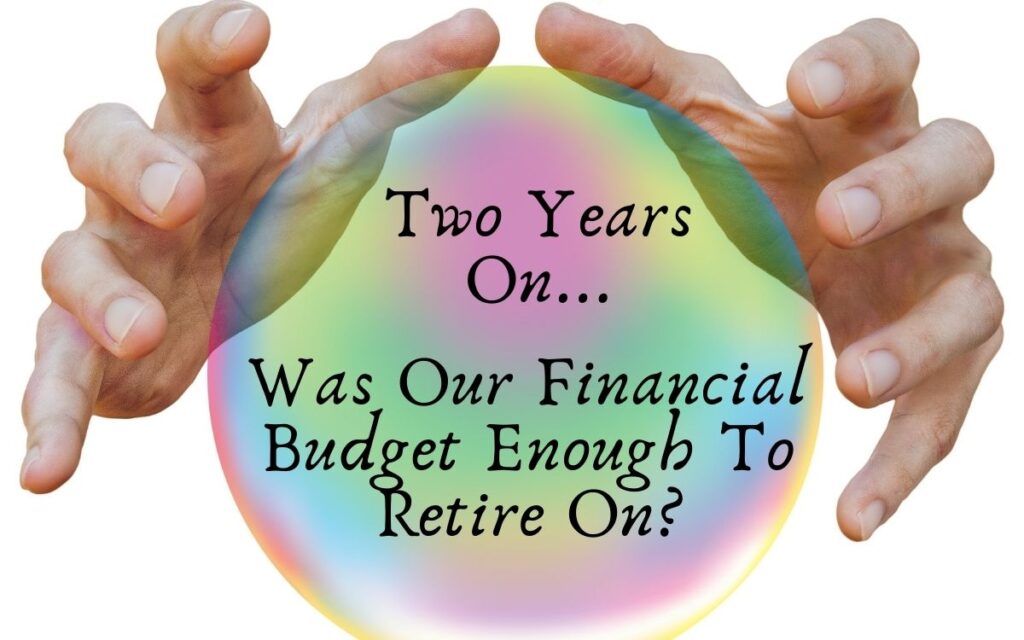Will our financial budget give us enough money to retire on? It must be one of the most frequently asked questions of anybody on the FIRE path. And asked by pretty much everyone as they get closer to retirement age.
It’s a delicate balancing act to get your financial budget ‘right’. Too much saving for the future can often come at the cost of enjoying the present. The opposite is ending up in retirement and trying to scrape a living on whatever state benefits permit. Not too many people’s idea of a golden retirement after decades of hard work.
The same is true whether you plan on retiring early or not. But if you do, it’s just a higher stakes game on getting that financial budget as good as you can get it. Longer to live with the consequences of choices made. Hard decisions to be made between returning to work or cutting back.
It can leave a lot of people stranded in the land of “OMY”, which translates to ‘One More Year’ syndrome. Putting off pulling the trigger to build a greater safety margin, a more luxurious lifestyle. Or Fatter, as it’s known in the trade. Which comes at a cost ofcourse. A few more years of earning, saving, investing. Hoping to still give yourself enough time to enjoy it all. Like I said, it’s a difficult tightrope to walk.
A Calculated Leap Of Faith
So how do you know if your financial budget will be enough to retire on? It’s certainly not helped by the myriad of ways the world ( or the internet.. ) will tell you to calculate your “number”. From the alluring simplicity of the 25x rule through to detailed cash-flow planning. Either by yourself or through a well-paid advisor.
They are all the same thing at the end of the day. Your best guess at what will be right for you. Some more educated than others but still based on estimates and assumptions. At some point you just have to take a calculated leap of faith. Or get pushed by life events.
We made the jump two years ago, giving up my well-paying career in London to live our lives the way we wanted to. So with the valuable benefit of hindsight – how did we do in getting our financial budget right?
How Did We Calculate Our Financial Budget?
Before I dive into revealing how well or not our financial budget has worked for us, it would make sense to have a quick re-cap on how we arrived at ours. As said, there are a lot of different ways to tackle this question. What matters most is that you understand your own method and are confident in it. I’m sharing ours purely because I realise it can be useful to compare.
Many methods start by looking at your expenses. I’ve always had a slight issue with this as “expenses” can mean many different things to different people. To me, for example, expenses is simply those unavoidable costs of living. Our “Must Have” level of spending. A warm, dry, comfortable roof over our heads. Bills covered. Food and transport.
It’s what a lot of people would call “Lean-FIRE”. And it’s a useful number to know for sure. But for most people life without any kind of entertainment, travel, meals or drinks out with friends, hobbies isn’t really what they think of as ‘life’. And so you get into the very personal space of how much is enough for you.
Setting Out Our Financial Budget
Lean-FIRE certainly wasn’t what we envisioned for our early retirement. We knew as soon as we had more free time, we would need more money. Travel was going to be a big part of our life after FIRE. We’d put off a number of places we wanted to go until we could do them justice. Spend a few months slow travelling our way through.
Likewise, we envisioned a lot more eating out, seeing friends. Taking up new hobbies and trying things out. We thought about our needs in old age, care home costs. Not as much fun but necessary.
For all aspects of our lifes, we didn’t want to feel restricted in our choices by setting our financial budget too low.
I don’t think our life is super luxurious, we tend to get a lot of bang for our buck. Think quality over quantity. It’s a good standard for us.
So when we set out our financial plans for early retirement, we actually increased our expenses from what we were living on. Doing our best to anticipate the future. Recognising we would never get it right and so including a healthy contingency allowance on top. This is what we ended up aiming for;
Our Annual Cash-Flow Requirements (Post-Tax)

It’s worth highlighting a couple of pretty glaring differences to many peoples financial budgets upfront here.
- If you remember, we built our own home 10 years ago. Leaving us mortgage-free. So the ‘House’ budget here is simply for repairs and house-hold items. All household bills are under, unsurprisingly, bills.
- We don’t have kids. So no school fees, child-care or any of the many other costs that come with that choice. This budget is just for the two of us.
This was the financial budget we put together based on our best assumptions about the life we wanted. It was what we used to calculate how much we needed to have in order to be able to retire early. We now have two years worth of data of early retirement life.
So the big question is – how are we doing so far? Let’s take a look…
Testing Our Financial Budget Assumptions
It’s probably worth mentioning at this point something rather shocking to much of the FIRE world at least.
We don’t use a budget..
Whisper it quietly maybe if you need to. But we’ve never sat down each month and checked how much we have spent. Sure, I validate all the credit card expenses for fraud and the like. And we have a rough idea of what comes in and what goes out. But a rigourous process for sticking to a budget. Nope, not us.
So it was with a fair bit of curiosity I set about downloading two years worth of data. No real idea of what I would find. Had we got close? Did we have a problem? It was a painful process at times, easier with some providers than others. Returning to our beloved Excel to bring it all together and turn it into something useful. Double-checking the numbers to make sure things hadn’t fallen off inadvertently.
Eventually I triumphed and a picture emerged. And wow, was it interesting. Especially when you can have a bit of a data-nerd tendency still 😉
So here in all it’s technicolour glory is the first test of our financial budget!

So How Did We Do?
A lot of data and a lot of numbers later, we had our first real view on how well or not our financial budget worked for our new lifestyle. Let’s take a look at how we did in each area…
Bills;
- Budget: £3.9k
- ’18/’19: £4.75k (+22%)
- ’19/’20: £4.47k (+15%)
So starting from left to right from our graph we can take a look at ‘Bills’. This ones pretty self-explanatory in that it’s all of our bills. Apart from anything car related. So council tax, electricity, phones, broadband, insurance, TV licences etc. All the stuff that’s pretty much required to live here in the UK.
Both years came out a little higher than budgeted for. But not by too much. It’s also encouraging how consistent the two years are. Suggests we can be reasonably confident this one won’t change too much going forwards.
So a miss in terms of our financial budget – but not one I’m going to lose too much sleep over.
Car;
- Budget: £2.2k
- ’18/19: £0.6k (-72%)
- ’19/20: £1.2k (-45%)
Second along our graph and another one that’s pretty self-explanatory. This part of the financial budget was planned to cover anything car related. So tax, insurance, fuel, MOT’s and any garage work etc.
This one varied more, driven ( pun intended..) to a large part by a couple of more expensive than usual repairs needed this last year. Though even including those, both years still came in way under our financial budget number. At an educated guess, I’d put this down to using the car a lot less than usual. Especially what with being out of the country so much more than before.
So yeah, a good result. Explainable and clearly not something causing us an issue.
House:
- Budget: £1.1k
- ’18/19: £0.3k (-70%)
- ’19/20: £2.0k (+80%)
Moving along the graph we get to ‘House’. This one almost doesn’t seem worth having it’s own category now as it’s pretty small. But we did and so we may as well do this exercise properly! House was intended to cover everything spent on our house, from repairs to diy and replacing furniture and the like.
A wildly variable result. One year spending next to nothing and the following year seeing us going over the budget by replacing our well-loved sofas. I suspect this trend will continue. But it seems far from out of hand or alarming.
Groceries:
- Budget: £10.4k
- ’18/19: £7.26k (-30%)
- ’19/20: £7.28k (-30%)
Moving on to groceries and we start to get to the serious budget items. The ones where if we’ve got this really wrong, it could see us running out of money in retirement.
It will not shock you to learn that groceries is….well….all the food and drink we’ve managed to cook and consume at home over the year. Yum! Good job we have that treadmill…
A little difficult at times to work out what with spending many months away. Some nifty data handling required to make it a fair comparison. So it’s pretty amazing at how consistent the two numbers are. And yes, I did triple-check them 😉
A bit of a result coming in 30% under our financial plan number. We’re not known for holding ourselves back in this space. The consistency makes it seem like it wasn’t just a fluke. So looking good here! S will be a happy man 🙂
Entertainment:
- Budget: £10.4k
- ’18/19: £6.0k (-42%)
- ’19/20: £4.8k (-54%)
Another chunky one in our budget, entertainment for us was always intended to cover things like evenings out with friends, meals out, a few beers and lunch whilst out on the bikes. Books to read, sights to see, things to do. That kind of thing.
We’d been generous (by our standards) as it was something we’d planned on doing a lot more of once we had the time to do so. And we have. Probably more so when away travelling than when back in the UK but still plenty across the year.
Despite our best efforts, we’ve still come in way below our intended budget target in both years. Unsurprisingly ’19/20 coming in a lot lower with the whole lockdown putting a bit of a brake on this.
So, got to be happy with that as a result. Maybe even a “Must try harder”?!
Travel:
- Budget: £20k
- ’18/19: £13.3k (-33%)
- ’19/20: £6.9k (-65%)
The last of our financial budget items and the biggest by far. I think I may have mentioned just a few times now that the freedom to travel more was one of our biggest FIRE motivations. And so we planned our budget accordingly.
We actually ended up travelling even more than we thought we would. Spending just under six months of the year away overall. Staying just enough to keep us legally and taxable in the UK! Obviously this dropped off with the pandemic hitting. After returning from SE Asia earlier this year, we have been on a trip to Prague. But nothing like we hoped or planned.
Either way, I was surprised to see both years coming in well under our budget. One of the unexpected joys of slow travel, it’s often much cheaper too. So more travel for less than our budget. Very happy with that.
Other:
- Budget: £0k
- ’18/19: £5.1k (+?!@%)
- ’19/20: £4.6k (+?!@%)
Hmm…oh dear. And we were doing so well! Having gone through everything I was left with a bunch of stuff we apparently hadn’t really got a budget for. You know, things like gifts for people (sorry family!) .Brewing equipment and ingredients. Clothes, shoes. Hiking gear.
Doubtlessly a few things could probably have been classed as ‘house’ or ‘entertainment’ . It’s hard to tell when it’s over two years and the statement just says ‘Amazon’. But rather than trawl through every single purchase, a handy ‘Other’ bucket seemed like it would work.
Either way, a sizable chunk of cash has gone out and been spent. The question is what has it done to our overall financial budget? Was our contingency bucket enough to cope with it as planned? Or has it all gone out the window at the last hurdle?
Judgement Time: Did We Have Enough Money?

Fortunately I have yet to be to court..
TV shows make it all look very dramatic at least..
So can you feel the tension rise on the final budget verdict…?!
Doing a bit of a Humpty Dumpty and putting the budget all back together again, we can now see the most important picture. How did we do overall? Well – it looked like this;

Time to break out the beer and balloons and celebrate I think?!
Despite our mishap with forgetting a few fundamental things in our budget, we’ve still come in easily under our financial plan. 2018/19 nicely under at 78% and 2019/20 even better at 65% of our original financial plan. An awesome result when, pandemic aside, we’ve done pretty much everything we’ve wanted to.
And that’s not even counting the big lump of contingency we have included. When you compare our expenditure against that we’re coming in 40-50% below our plan.
Now two years of good numbers does not mean it’s a done deal. But as said, we’ve been living pretty much exactly how we want to, pandemic excepted this year. So having that much of a cushion is certainly reassuring we’re on a good path. Good to know in these crazier than usual market times.
So I’m glad I made the effort to go through the data. I’ve learned a lot for sure through doing it. And with that benefit of hindsight now, I can see a few themes that may help others putting together their own financial plan for retirement.
Top Lessons Learned For Planning Your Retirement
So without further ado – here are the three things it would have been useful to know when putting our financial plan together.
1. You Can Live On Less Than You Think
When looking at how we have spent our money over the last two years there was one really striking thing. Just how little we spent on the bare minimum to live. Our ‘Must’ spend is a tiny 27% and 31% of our financial budget excluding contingency for 18/19 and 19/20 respectively.
I know that excludes any kind of mortgage or rent but I still think that’s pretty low. Especially when we aren’t even trying to save money. It’s one of those encouraging ‘worst case’ scenario things. We’d be able to survive on a lot less if we needed to.
2. You Won’t Get It Right – But It Will Be Good Enough
Going through each of the categories it was striking how some were very consistent and some varied a lot. And it was entertaining in a perverse British humour kind of way just how much stuff we forgot to include a home for.
But in hindsight it really wasn’t a bad effort. The differences equaling themselves out overall. That’s what really matters at the end of the day. I’m a big believer in the 80/20 rule.
Focus on getting the big things right and the rest will take care of themselves.
Don’t tie yourself up in analytical knots but instead have a decent contingency plan. Know how you can flex your budget if needed.
The ability to adapt is far more important than obsessing on getting it ‘right’.
3. Only You Know How Much A Safety Margin Is Worth
There’s clearly a lot of contingency in our financial budget. More than we thought and we’d already been pretty generous. If pushed, we could quite easily cut back on travel and entertainment if needed. There’s a lot of flex in our budget and there’s more contingency on top.
And that’s in large part down to knowing that it would be very difficult to return to a job that was as well-paying or flexible as the one I had. It was a bit of a one-way ticket. Sure, I could do something else but for us, working those few extra years was worth reducing the risk of needing to.
That’s something only you can decide for yourself. Your willingness or ability to return to earning money if needed. An alternative to saving longer for a bigger safety margin.
Over To You - Owning Your Own Financial Budget
As I’ve said many a time and doubtlessly will again. This is all very personal to us. It works for our lifestyle choices, what brings us pleasure and meaning.
It will be different for you. Only you can know what you want out of life. What balance is right for you between time and money. But I think the lessons learned above should help everybody.
I’d love to hear what you thought of our ‘benefit of hindsight’ analysis and how you approaching your own retirement plans. Let me know!





Pingback: What Inflation Means for the FIRE Movement - Fintech News Hubb
Great stuff – in particular that your estimations both in terms of category ratios and their specific budgets weren’t too far off; other than being a tad pessimistic 😉
I handed in my 3 month notice on Jan 2nd 2020 (it’s all in the timing) with the intention to travel the world (inspired by our kids). Which is now something to still look forward to kicking off! I look forward to reading your (now bookmarked) travel entries…
Regarding Budget planning, we based ours on MoneySavingsExpert’s Budget spreadsheet with its conveniently pre-decided categories and entries, tailored to define 3 separate budgets: Basic; Comfortable; and Desirable. The idea being that our annual drawdown is based on one of those, depending on the performance of our Pensions the previous year. Part of that equation uses a Personal Inflation rate derived from those budgets.
I suspect that, like most spreadsheet lovers possibly, I have gone into far too much Thought & Detail with this, and that as time goes by I will simplify it greatly; assuming I can bring myself to do it! 😉
Keep up the great work!
Harps
Hey Harps, cheers for stopping by & taking the time to comment. Always good to hear from new readers.
Congrats on handing the notice in – it’s a strange moment for sure when you know/hope it’s the last time ever! But yeah, top timing 😉. I have to admit I’m really happy we got at least some travel in before all the lockdowns et al. I’m a bit slow catching up on writing the travel stuff but still lots to add. Honestly, I think you’ll love it – slow travel in particular is so rewarding.
The idea of Basic/Comfortable/Desirable is a good one – we did something similar in our planning. A kind-of “what we could live on vs what we want to”. It’s comforting to know both.
Ha – can you go too far with a spreadsheet…🤣?!? But yeah, once you get used to not being at a laptop all the time, the spreadsheets defn get a bit dusty!
Thanks for sharing, it was an interesting and very useful read. We too are hoping to do lots of travel in our early retirement and we are aiming for £40k a year so I was a bit worried when I saw your £60k budget but felt much better by the end of your blog.
Hey. Glad you enjoyed it & found it useful. It’s amazing how much travel changes when you are no longer limited by time. The flexibility and slow style in particular can mean you get a lot for your pound if you want to! And as you can tell, we’re not exactly frugal or backpacker.
Always exciting to hear from other people looking to do something similar – let us know how you get on!
It’s great to see some worked out examples of budgeted costs and actual spending.
My view is that once you take away work from your life, a lot of things become optional like running two cars on expensive leases or private school because the compromise between mortgage, work and local schools means school fees make sense.
The big difference between us is that you don’t have kids – so you have a lot more freedom to slow travel.
Slow travel for us is how it takes us half an hour to walk to the playpark 800m away.
Hey! Nice to hear from you guys – still celebrating your recent success I hope 🙂 Glad you found it interesting – it was eye-opening that we had no real idea how it would turn out.
Absolutely agree – it’s awesome that my old train ticket cost now funds 4 months of travel! Much better use…
Did laugh at the playpark line…love it. Yeah, whatever people say it’s harder with kids. Though doable – as you are showing everyone.
Really interesting- though, it seems like you need a few extra budget categies rather than lots of “other” perhaps? Least, you are still well under budget, and I’m guessing this year with lack of travel will be much the same. It’s something that really worries me- “just one more year” will get me for at least 1 more year, probably more like 2, just so that I am entirely comfortable about jumping out of work and never coming back.
Hey, glad you enjoyed! Ha, yeah – one of the the upsides of not using a budget, no real worries on the individual categories!
I think it’s an interesting balancing act, getting the margin of safety that works for you. I kinda think it’s never a 100% comfortable point to jump but you get to a level that’s ok for you. Look forward to seeing how your journey goes!
Great to see some results from the other side. How much of an impact to the timing of retirement did building your house have? Did you choose a location and materials that were cheaper?
Hey Matt. Glad you found it interesting! Tbh, I’m not sure, probably about equal. We made a decent return on building our own home by doing so much ourselves but obviously we could have left our savings compounding if we had got a mortgage. Either way, I wouldn’t do it differently.
We choose a piece of land a little further out so it was a little cheaper. But then we have a pretty high quality spec house. Oak windows, granite worktops etc. We love it 🙂